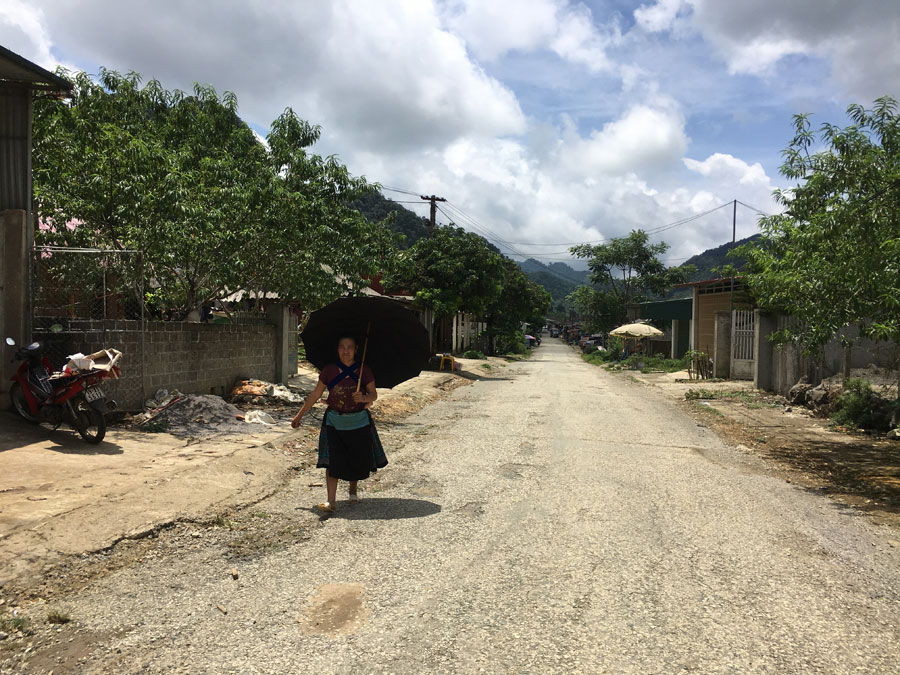
(HBO) - Together with maintaining cultural identities of Thai and Mong ethnic groups to develop tourism, Mai Chau district has paid attention to upgrading rural transport infrastructure. Despite a wide terrain and many hills, Mai Chau has a convenient rural road system which meets the travel demand of locals and contributes to welcoming investors to the tourism sector.

Pa Co commune’s roads have been invested and upgraded
to meet travel demand, thus contributing to developing community-based tourism
of the locality (Photo taken in Cha Day hamlet)
Anyone who comes to Mai Chau will be
impressed with the winding roads embracing mountainside villages. Inner-field
and inter-hamlet roads are spacious and clean, with colourful flowers on both sides,
creating a special attraction to tourists. According to statistics, the
district has 608.23 km of roads (excluding national highways and provincial
roads), of which there are 64.69 km of asphalt roads, 333.77 km of concrete roads,
14.29 km of macadam roads, and 195.47 km of dirt roads. The district has seven
communes meeting criterion No.2 in terms of transport in building new-style
rural areas, namely Tong Dau, Chieng Chau, Mai Ha, Van Mai, Mai Hich, Xam Khoe
and Pa Co. Four communes fulfilled three criteria, three communes meet two
criteria and one commune meets one criterion.
The district People's Committee has
directed authorised agencies and People's Committees of communes to mobilise
resources from local people and businesses to implement the project of concreting
rural roads during 2017 - 2020. Up to now, the district has completed and opened
to traffic 10.49 km of 45 roads, while construction is underway on 0.7 km of 2
roads. The total investment is more than 5.4 billion VND, of which more than
3.2 billion VND came from the provincial budget, and over 2.2 billion VND from
the district budget.
The district has paid attention to
implementing disaster prevention and control and ensuring traffic safety, while
focusing on installing danger warning boards at landslide-risk areas and
bridges. The district maintains the implementation of the campaign "All people engage
in upgrading rural transport” in April and November to carry out the maintenance
and repair of rural roads. In 2020, locals have contributed over 115,000
workdays to construct rural roads./.
Located just a 20-minute drive from Hoa Binh City, Ora Hill Farmstay & Glamping Hoa Binh is a captivating new destination nestled in Mo hamlet, Bình Thanh commune, Cao Phong district. Combining farming with leisure, this tranquil retreat is perfect for those seeking balance, joy, and an immersive experience in the expansive beauty of nature.
Muong Bi - Tan Lac is renowned as one of the four famous Muong regions in Hoa Binh province. Blessed by nature with a favourable climate and stunning landscapes, Tan Lac holds great advantages for tourism development. The local tourism industry has made remarkable strides in recent times thanks to the attention and support from the local authorities and sectors.
With its strategic location, well-developed transport network, and diverse soil and climatic conditions, Hoa Binh is emerging as a must-visit destination in Vietnam's northwestern tourism corridor. The province boasts numerous attractions, including the Kim Boi hot springs (Kim Boi district), the Dau Rong cave complex (Cao Phong), the Mai Chau valley (Mai Chau), and the iconic Hoa Binh hydropower plant.
The northern mountainous province of Hoa Binh has been listed among the 71 most beautiful places to visit worldwide by the prestigious US travel magazine Condé Nast Traveller.
Hoa Binh province’s rich natural and cultural resources position it as a prime location for developing community-based tourism (CBT). In recent years, support from central and provincial policies, as well as assistance from non-governmental organisations, have encouraged local ethnic minority and mountainous communities to actively engage in the sector.



